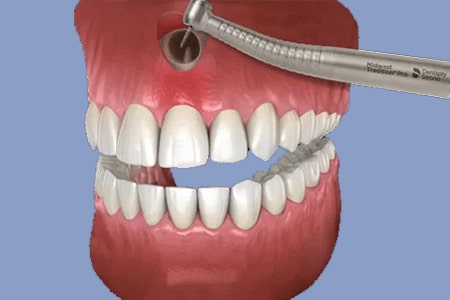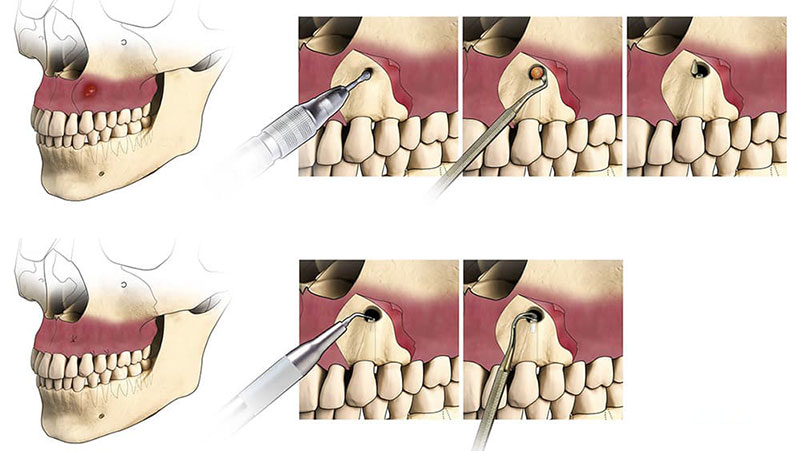Apicoectomy (root-end cyst surgery)
The first step in understanding apico surgery is to gain some knowledge about dental anatomy. Inside your tooth, there is a soft tissue called the pulp, which contains blood vessels and nerves. The pulp extends from the top of the tooth, known as the crown, all the way down into the root, where it connects to your circulatory and nervous systems.
The tissue around the tip of the root may become re-infected or painful even after undergoing root canal treatment.
The most common surgical procedure used to save damaged teeth is called an apicoectomy, or root-end resection.
This procedure is used to identify fractures, infection sites, or hidden canals that are not visible on X-rays but are causing pain. Damaged areas of the root or surrounding bone may also be treated using this method.
Note: After multiple stages of root canal treatment, or in cases where a bridge has been placed on the tooth, if the root canal becomes infected and painful again, your dentist may recommend apico surgery.
Why does the dentist recommend an apicoectomy?
If an infection occurs after root canal treatment and persists, an apicoectomy, also known as root-end surgery, may become necessary. If this surgery is recommended to you, it means that your tooth cannot be saved with regular root canal treatment. Often, the only alternative to an apicoectomy is tooth extraction, which may affect nearby healthy teeth. The goal of an apicoectomy is to preserve the function of your natural tooth.

Steps of performing an apicoectomy:
- Injection of a local anesthetic to numb the area around the infected tissue.
- Making an incision in the gum tissue to expose the bone and the inflamed surrounding tissue.
- Removal of the inflamed or infected tissue, along with the tip of the root.
- Filling the root tip with specialized material and sealing it.
- Using several stitches to help the area heal faster.

Post-operative care after apicoectomy surgery:
- Keep the sterile gauze placed by your doctor on the surgery site in your mouth for one hour. Speak with your mouth closed, swallow your saliva, and avoid spitting.
- Apply a cold compress, provided by the clinic, during the first 24 hours. Place it on the wound for five minutes, then remove it. On the second day, rest. On the third day, if there is swelling, use a warm compress.
- If there is bleeding at the surgery site, moisten a tea bag, place it on the wound, and contact us.
- After the anesthesia wears off, you may experience pain. To relieve the pain, you can take the prescribed painkillers.
- On the second day, rinse your mouth with mouthwash or saline solution (diluted saltwater) to disinfect.
- For the first 12 hours after the extraction or surgery, only consume cold, liquid foods. Avoid chewing on the side that underwent surgery for up to one week.
- For about a week after surgery, avoid heavy physical activity, smoking, and using a hookah.
- Finally, avoid disturbing the wound and stitches. If you experience any issues, please contact us.
Summary
Our teeth are held in place by roots that extend into the jawbone. An apicoectomy is a procedure in which the tip or apex of the tooth root is removed. A dental specialist may recommend an apicoectomy, also known as root-end surgery, to remove infected tissue.
Apicoectomy is a common procedure that can be the best choice for saving a natural tooth from infection or extraction. Even though the procedure may be challenging, it remains a suitable and satisfactory option as it restores your oral health.
Our Services for Patients at the Clinic
FAQ
What services are offered at Dr. Hamed Keramat's Specialized Dental Clinic?
Could you provide the clinic's address and how to get there?
How can I know the exact cost of dental services before treatment?
What are the working hours of Dr. Hamed Keramat Specialized clinic?
Dr. Hamed Keramat specialized clinic is open on Saturdays, Sundays, Mondays, and Wednesdays in the afternoon shift, and on Tuesdays and Sundays in the morning shift to serve you, our esteemed patients.
How can I book an appointment at Dr. Hamed Keramat specialized clinic?
To book an appointment at Dr. Hamed Keramat specialized clinic, simply call 88694120 or fill out the contact form on Dr. Keramat’s clinic website, and our experts will get in touch with you as soon as possible.
